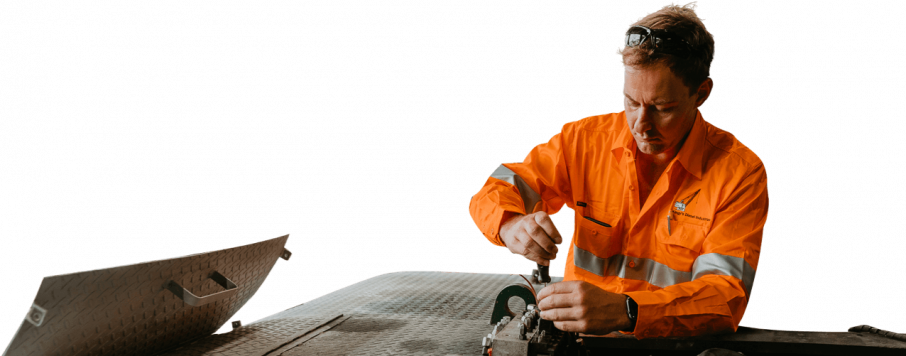COULD YOU GIVE US A SUMMARY OF YOUR PROFESSIONAL JOURNEY SO FAR? HOW DID YOU COME TO BE IN YOUR CURRENT ROLE?
I started my apprenticeship as a diesel mechanic at Walter Wright cranes in Mackay when I was 15 years old. Growing up with my father in the industry, I wanted to see what cranes were all about.
After completing my apprenticeship I worked at various sites all over Australia and PNG, before starting my business on the Sunshine Coast.
Starting out with one ute and operating solo, I saw the need for Crane Techs on the Sunshine Coast and in South East Queensland.
Now, the business has an established mechanical workshop with a team experienced in crane maintenance.
HAVE YOU WITNESSED THE CHANGES IN CRANE TECHNOLOGY OVER THE YEAR? WHAT HAPPENED, AND WHAT DID YOU LEARN?
From a maintenance perspective, there are plenty of technological changes in the crane industry at the moment.
All load moment indicator systems are being updated to stop the risk of being bypassed. They are being ‘foolproofed’ so to speak. It makes operations a bit tricky, but from a maintenance point of view i’s eliminating the ‘test and try method’ which is a good thing.
With the current shortage on new cranes and major inspection time slots, a lot of older machines that are out of date with Australian standards are being brought up to speed. We have been fitting hydraulic motion cut limiters to load moment systems on machines as old as 1984.
A technical side is also being brought into the crane borer electrical game.
We have completed a lot of upgrades on outrigger location, side slope, and all sorts of custom load moment safety systems.
WHAT IS THE MOST COMMON ACTION OR BEHAVIOUR YOU WITNESS IN THE FIELD WHEN OPERATORS DON’T PLAN FOR THESE CHANGES OR ADVANCES? HOW DO YOU THINK WE CAN FIX IT?
As a maintenance business, we only usually get involved when it has all gone wrong, or is about to.
I think a clear lift plan, including ground conditions, is imperative. From a maintenance point of view, don’t be too intimidated to ask what a control does on the crane. It could be the difference between whether or not an incident occurs.
DO YOU HAVE ANY THOUGHTS OR IDEAS ON AN INNOVATION OR PROCESS THAT MAY HELP TO ADVANCE CRANE OPERATIONS?
More training around the safety systems on the machines. Operators need to understand that safety systems are on the machines to help eliminate or prevent an incident.
WHAT DO YOU FEEL IS THE MOST IMPORTANT SAFETY ISSUE AFFECTING YOUR PARTICULAR ROLE IN THE INDUSTRY TODAY?
The lack of training or communication from Work Safe regarding the major inspection process and annual inspection process.




